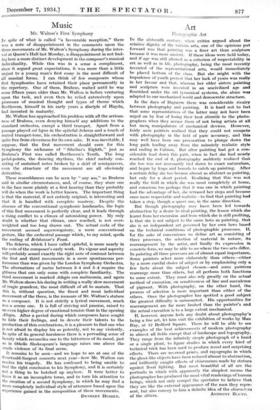Music Mr. Walton's First Symphony
Iv spite of what is called "a favourable reception," there was a note of disappointment in the comments upon the three movements of Mr. Walton's Symphony during the inter- val at Queen's Hall last Monday, a disappointment in not find- ing here a more distinct development in the composer's musical individuality. While this was in a sense a compliment, since it argued great expectations, it was more than a little unjust to a young man's first essay in the most difficult of all musical forms. I can think of few composers whose first Symphonies have retained their place permanently in the repertory. One of them, Brahms, waited until he was some fifteen years older than Mr. Walton is before venturing upon the task, and even then he relied extensively upon processes of musical thought and types of theme which Beethoven, himself in his early years a disciple of Haydn, had invented in maturity.
Mr. Walton has approached his problem with all the serious- ness of Brahms, even denying himself any additions to the standard orchestra, except a third trumpet. Apart from a passage played col legno in the spiteful Scherzo and a touch of muted trumpet-tone, his orchestration is straightforward and quite free from cleverness for its own sake. It was inevitable, I suppose, that the first movement should earn for this Symphony the nickname of " Sibelins's Eighth," just as Brahms's First was called Beethoven's Tenth. The long pedal-points, the dancing rhythms, the chief melody con- sisting of sustained notes broken by a skirl of semiquavers, even the structure of the movement are all obviously derivative.
These resemblances can be seen by " any ass," as Brahms said in similar circumstances, and, of course, they stare one in the face more plainly at a first hearing than they probably will do when the work is better known. The important thing is that the material, if not entirely original, is interesting and that it is handled with complete mastery. Despite the absence of the conventional symphonic landmarks, the logic of this first movement is perfectly clear, and it leads through a rising conflict to a climax of astonishing power. My only doubt is whether that climax, once reached, is not over- weighted and too long drawn out. The actual coda of the movement seemed supererogatory, a mere conventional gesture, like the orchestral passage which, to my mind, spoils the ending of Belshazzar's Feast.
The Scherzo, which I have called spiteful, is more nearly in the vein of the composer's early work. Its vigour and asperity will probably sound exactly the right note of contrast between the first and third movements in a more spontaneous per- formance than was given by the London Symphony Orchestra. The alternations of metre between 8-4 and 5-4 require the glibness that can only come with complete familiarity. The third movement is marked Adagio con malinconia, and again Mr. Walton shows his daring in writing a really slow movement of tragic grandeur, the most difficult of all to sustain. That this is, without question, the finest and most individual movement of the three, is the measure of Mr. Walton's stature as a composer. It is not strictly a lyrical movement, much less a serene one. It is full of striving and passion, raised to an even higher degree of emotional tension than in the opening Allegro. After a period during which composers have sought to hide their feelings, and to devote their talents to the production of thin cerebrations, it is a pleasure to find one who is not afraid to display his so potently, not to say violently. In spite of its general harshness there is a pervading sense of beauty which reconciles one to the bitterness of its mood, just as in Othello Shakespeare's language raises one above the crude violence of its final scene.
It remains to be seen—and we hope to see at one of the Courtauld-Sargent concerts next year—how Mr. Walton can resolve his tragedy. He has confessed to being unable to find the right conclusion to his Symphony, and it is certainly not a thing to be botched up anyhow. It were better to leave it as an incomplete torso, and to turn his attention to the creation of a second Symphony, in which he may find a more completely individual style of utterance based upon the experience gained in the composition of these movements.
DYNELEY HUSSEY.


















































 Previous page
Previous page